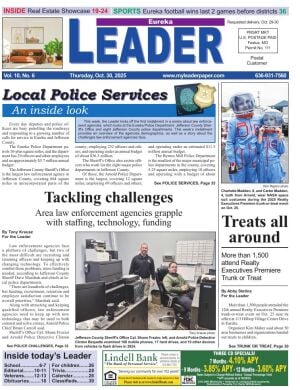Officials are worried about our children.
The American Academy of Pediatrics, the American Academy of Child and Adolescent Psychiatry and the Children’s Hospital Association recently declared “a national emergency” in youth mental health.
Early in December, U.S. Surgeon General Vivek Murthy released a public advisory warning stating that mental health among the nation’s youth has reached the level of a crisis.
On the local level, officials have begun implementing measures to address the problem, with plans to expand even further.
An open house and ribbon-cutting was held in October at Chestnut Health’s Project Access office in Hillsboro. The collaborative project provides mental health resources for students and adults and is funded from a variety of sources, including the Jefferson County Community Mental Health Fund Board, the Jefferson Foundation, Comtrea, local school districts and corporate and private donations.
The program has three main parts, including placing mental health counselors in schools.
“We have counselors embedded in five (soon to be six) local school districts,” said Missy Endres, executive vice president for the Jefferson Foundation. “Their role is to provide mental health and substance abuse services to kids, coordinating with school staff and other programs (like Comtrea).”
The program also provides adult and child services onsite, with a walk-in clinic at the Chestnut Health office.
“There is so much need,” said Brent Cummins, clinical director of integrated behavioral health services for Chestnut Health. “I oversee adult services – substance abuse, mental health, medication therapy – and we get a lot of referrals from Probation and Parole. We thought we’d see mostly substance abuse, but we see much more general primary mental health issues.”
Cummins said when it comes to mental health counseling, immediacy is crucial.
“They can walk in here on a Tuesday, or even call on the phone, and we screen the call, determine the best place to send them for the specific help they need,” he said. “The timeline is critical. Often they can get an appointment that same week to begin therapy or get medication.”
For the final piece of the puzzle, a team of contributors from several local agencies has worked together to develop a universal intake and assessment tool that connects students with the services they need in as streamlined a way as possible.
Bringing it together
At a countywide summit in 2018, representatives from several agencies gathered to talk about the problem of coordinating resources in the face of skyrocketing numbers of students and adults needing mental health care.
Money is available for mental health programs; the Jefferson County Community Mental Health Fund Board’s 1/8-cent sales tax brings in $2.8 million annually and its .0910-cent property tax levy generates another $3.1 million. The Jefferson Foundation provides $2 million in funding, and Comtrea provides additional funds.
But the missing part of the equation has been coordination, which has contributed to long waiting lists for treatment.
Circuit Judge Darrell Missey, chief administrative judge of the county’s Family Court, said he is often frustrated after he recommends diagnosis and treatment for offenders.
“They don’t need to sit in jail for weeks and months, waiting to get an appointment,” he said.
Duplication of effort is another obstacle.
“It’s great to see us work together, pooling knowledge and resources, instead of repeating and duplicating, which slows down services,” said Clint Johnston, Jefferson R-7 School District superintendent.
Building partnerships
The Jefferson Foundation has awarded $1 million annually, beginning in September 2019, to fund Project Access.
“This is not a grant, like the ones on the long semi-annual list; this is ongoing funding,” Endres said. “It wasn’t a direct result of the summit, but those kinds of conversations played into it. We conducted a needs assessment, reaching out to community partners. Overwhelmingly, the results were mental health issues and substance abuse, and they recommended Chestnut. So we did a site visit to one of their facilities, were impressed, and made them the offer.
“That’s the nice thing about the Foundation. There’s not a lot of waiting around.”
Project Access began operations in early 2020.
“The first staff was hired in March 2020 – two weeks before the pandemic shutdown,” said Jim Wallis, director of business development with Chestnut Health. “The office actually opened in June.”
The program began in schools around the same time.
“We have three full-time counselors at Hillsboro R-3, one each at Jefferson R-7, De Soto and Dunklin R-5, and will have two at Windsor once our agreement there is finalized,” said Jamie Perry, director of school-based services for Chestnut.
“We have interest from other districts, too. Our hope is to provide services to every district that wants it.”
Chestnut staff meet monthly with district leadership to make sure everything is running smoothly.
Melissa Tate is a licensed professional counselor embedded full-time in the Dunklin R-5 School District.
“We get a referral from the school or the parents, and we do an intake assessment and a history and develop a treatment plan,” she said. “Typically, we meet weekly with the student to work toward goals.”
Tate said students have a variety of challenges they need help with.
“It can be both preventive and remedial,” she said. “Sometimes parents see stress building, problems looming, and they seek a way to prevent it from getting bigger, more problematic.
A lot of the children we see, though, have been through some sort of trauma, and for them it’s about remediating.”
Perry said the program tailors services to the patients’ needs.
“This isn’t necessarily a long-term thing,” she said. “Some kids, we may just have to help them for a short time and then they get released. They might just need help through a rough patch, or for a specific issue.
“We also have year-round services, summer programs for kids in things like social skills, coping strategies, grief, anger management, LGBTQ.”
Having Project Access counselors on hand frees up school staff for other duties.
“We have several counselors on staff, of course, but they have scheduling, college and career planning, interpersonal relations, all to deal with, in addition to mental health,” Dunklin Superintendent Clint Freeman said. “With the partnership (with Chestnut), we can focus on kids’ mental health. We want to let kids know it’s OK to be not OK, to allow them to work through issues.”
Freeman said his district is already looking to expand the partnership.
“We hope to do a cost-share with Chestnut to get additional school-based counselors,” he said. “We want to focus on giving kids strategies to be successful in life.”
Endres said the Jefferson Foundation is “thrilled” with the program. “We couldn’t be happier that we’re increasing much-needed services for our community.”
Streamlining the process
One of the earliest goals in the development of Project Access was increasing just that – access.
“Intentional or not, our system has created barriers to getting people the services they need,” said Steve Horn, intervention specialist with the Jefferson R-7 School District. “The most common mental health issues are depression and anxiety, which can be the result of trauma and which can then lead to substance abuse. It’s kind of a domino effect. The longer it goes on, the harder it is to treat, so early identification and intervention is key.”
Identification has been relatively easy, but getting services has been a bottleneck.
“Parents don’t know where to go; they have to be dependent on others as they move through the system, which is very challenging,” Johnston said. “We needed to find ways to shorten the distance between the person in crisis and the help they need – not weeks or months down the road.”
Horn has been part of the team working to develop a universal intake and assessment tool to connect families with the help they need in as streamlined a fashion as possible. Called Aspen, it was spearheaded by the Jefferson County Health Department, and is set to go live starting in January in the Jefferson R-7 and De Soto school districts.
“It’s an online database for all districts to log in and access,” Horn said. “Once the student assessment is completed, it generates a list of appropriate services that can be filtered by location, by insurance, by what the need is.
“We’ve done a decent job of identifying need; we have just had trouble with the next step. This helps us do that.”
Horn said the program is being rolled out only for schools, but plans are to make it available to the general public.
“We’ve been going school-to-school, presenting and answering questions,” he said. “We’ve even presented it on the state level, and we have a lot of other people interested.”
In addition to Horn and Johnston, other team members are Jaclyn Brown and Anne-Marie Denny with the Jefferson County Health Department, Billie Hartgrove with the De Soto School District, Tony Sokolic of Comtrea and Jim Wallis of Chestnut Health.
“This project has been a result of what we can achieve when we collaborate among schools and community treatment providers,” Horn said. “We don’t have to be competitors; collaboration is better in the end for everyone.”




